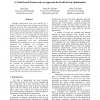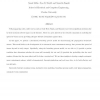205 search results - page 17 / 41 » A research demonstration of code bubbles |
CGO
2005
IEEE
14 years 2 months ago
2005
IEEE
Although optimizations have been applied for a number of years to improve the performance of software, problems that have been long-standing remain, which include knowing what opt...
DSN
2005
IEEE
14 years 2 months ago
2005
IEEE
Self-propagating codes, called worms, such as Code Red, Nimda, and Slammer, have drawn significant attention due to their enormous adverse impact on the Internet. There is a grea...
ACMMSP
2005
ACM
14 years 2 months ago
2005
ACM
ct In the past, program monitoring often operates at the code level, performing checks at function and loop boundaries. Recent research shows that profiling analysis can identify ...
CTRSA
2005
Springer
14 years 2 months ago
2005
Springer
Abstract. In the last few years we have concentrated our research efforts on new threats to the computing infrastructure that are the result of combining malicious software (malwar...
WCRE
2003
IEEE
14 years 2 months ago
2003
IEEE
In reverse engineering, parsing may be partially done to extract lightweight source models. Parsing code containing preprocessing directives, syntactical errors and embedded langu...


